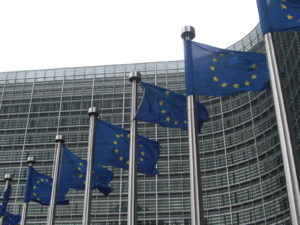 When the pandemic started and court hearings by video became a real thing, German lawyers found, sometimes to their surprise, that the law was actually quite advanced: Already back in 2002, Section 128a ZPO was introduced to allow the conduct of court hearings using videoconferencing technology and the law was updated in 2013 (see our earlier post “Remote Courts in Germany” for details). The law in action has since caught up with the law on the books: Courts have been equipped with the necessary hardware and hearings by videoconferencing have become a regular feature in many court rooms across the country – and they are likely to stay in a post-pandemic world. However, there remains some uncertainty regarding the use of videoconferencing in a cross-border context.
When the pandemic started and court hearings by video became a real thing, German lawyers found, sometimes to their surprise, that the law was actually quite advanced: Already back in 2002, Section 128a ZPO was introduced to allow the conduct of court hearings using videoconferencing technology and the law was updated in 2013 (see our earlier post “Remote Courts in Germany” for details). The law in action has since caught up with the law on the books: Courts have been equipped with the necessary hardware and hearings by videoconferencing have become a regular feature in many court rooms across the country – and they are likely to stay in a post-pandemic world. However, there remains some uncertainty regarding the use of videoconferencing in a cross-border context.
Category: Law Reform
Germany and Pre-Trial Discovery of Documents: A New Proposal
 Germany has made a reservation under Article 23 Hague Evidence Convention and does not execute letters of request “issued for the purpose of obtaining pre-trial discovery of documents as known in Common Law countries.” Long-time readers of this blog may recall that we had posts like “Is Germany’s Position on Pre-trial Discovery of Documents under the Hague Evidence Convention Softening?” (2015) and even “Germany’s Position on Pre-trial Discovery Softens!” (2017) before. Spoiler alert: Germany’s position did not change. Shortly after the 2017 post, the Legal Committee (Rechtsausschuss) of the Bundestag killed the proposed softening of Germany’s reservation under Article 23. With this note of caution, we report on a new attempt at changing Germany’s position. Read More
Germany has made a reservation under Article 23 Hague Evidence Convention and does not execute letters of request “issued for the purpose of obtaining pre-trial discovery of documents as known in Common Law countries.” Long-time readers of this blog may recall that we had posts like “Is Germany’s Position on Pre-trial Discovery of Documents under the Hague Evidence Convention Softening?” (2015) and even “Germany’s Position on Pre-trial Discovery Softens!” (2017) before. Spoiler alert: Germany’s position did not change. Shortly after the 2017 post, the Legal Committee (Rechtsausschuss) of the Bundestag killed the proposed softening of Germany’s reservation under Article 23. With this note of caution, we report on a new attempt at changing Germany’s position. Read More
German Bar Association – Civil Litigation Committee
 The German Bar Association (Deutscher Anwaltverein – DAV) comprises 252 local bar associations and more than 61,000 individual lawyers. It represents the interests of the German legal profession at the national, European and international level. I am honoured to have been appointed to its Civil Litigation Committee (Zivilverfahrensausschuss).
The German Bar Association (Deutscher Anwaltverein – DAV) comprises 252 local bar associations and more than 61,000 individual lawyers. It represents the interests of the German legal profession at the national, European and international level. I am honoured to have been appointed to its Civil Litigation Committee (Zivilverfahrensausschuss).
Art Law and the New German Government: Legislative Goals for Looted Art and Restitution
 Today’s election of Olaf Scholz as Angela Merkel’s successor marks the official start of the new „traffic light“ coalition government. The new government draws its name from the colours traditionally associated with the supporting parties: „red“ Social Democrats, „yellow“ Liberals and the “Green” Party. These three parties have set out their legislative programme in a 177-page coalition agreement (Koalitionsvertrag). Both Nazi looted art and art from a colonial context feature in the Coalition Agreement. Almost inevitably, like in other fields, the Coalition Agreement is short on detail. For Nazi looted art, however, its brevity notwithstanding, the Coalition Agreement defines four concrete legislative goals*. Here they are, with my initial assessment: Read More
Today’s election of Olaf Scholz as Angela Merkel’s successor marks the official start of the new „traffic light“ coalition government. The new government draws its name from the colours traditionally associated with the supporting parties: „red“ Social Democrats, „yellow“ Liberals and the “Green” Party. These three parties have set out their legislative programme in a 177-page coalition agreement (Koalitionsvertrag). Both Nazi looted art and art from a colonial context feature in the Coalition Agreement. Almost inevitably, like in other fields, the Coalition Agreement is short on detail. For Nazi looted art, however, its brevity notwithstanding, the Coalition Agreement defines four concrete legislative goals*. Here they are, with my initial assessment: Read More
